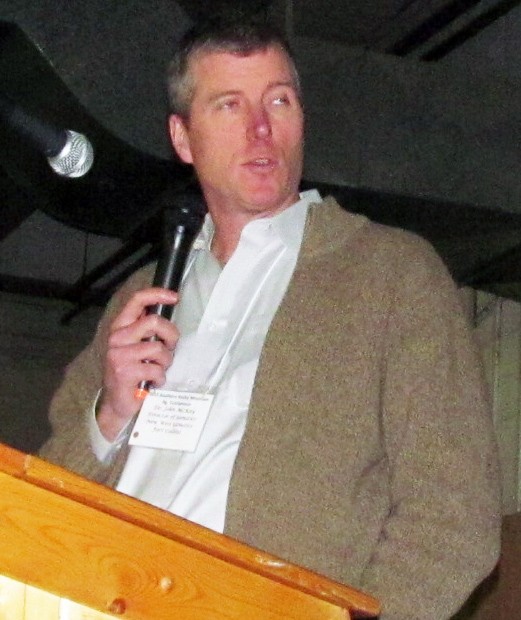Hemp popular topic at ag conference

MONTE VISTA — In one of the most well attended sessions of the 2019 Southern Rocky Mountain Agricultural Conference & Trade Show on its opening day on Tuesday, Dr. John McKay cautioned area farmers not to jump on the hemp bandwagon without a market contract in place.
McKay was one of about 15 speakers to address topics ranging from soil health to biological pest control on Tuesday, the opening day of the 38th annual conference, one of the longest running in the state according to host Marvin Reynolds, area director and extension agent for the SLV Area CSU Extension.
The conference continues today, Wednesday, at Ski Hi Park in Monte Vista with business-related topics and keynote speaker Former Commissioner of Agriculture Don Brown, and concludes Thursday, Feb. 7, with water-related topics.
Tuesday’s sessions focused on agronomics, with the hemp discussion packing the Ski Hi auditorium.
McKay, director of genetics for New West Genetics, reminded the audience how the hemp industry has opened up with the passage of the 2018 Farm Bill redefining and de-criminalizing hemp.
“This recognizes hemp nationwide,” McKay said.
However, he added that it wasn’t long after the Farm Bill passed that the government shut down, so USDA does not yet have a plan in place for federal hemp regulation, which could take a while. The 2018 Farm Bill includes the Hemp Farming Act that forces the federal regulator agencies to deal with hemp, McKay said. This will affect all facets of growing hemp from ag loans to crop insurance, he said. Also, USDA National Agricultural Statistics Service (NASS) will start collecting data on such aspects and yield and markets.
Local hemp growers must register with the Colorado Department of Agriculture, the regulatory agency in Colorado.
Since 2014 hemp production has been legal in Colorado and Kentucky because those states have regulated hemp programs, but now it is open to growers in all 50 states as long as it contains less than .3 percent of THC, the potent ingredient in its cannabis cousin marijuana.
“That’s the only difference between hemp and marijuana … between farming and a felony,” McKay said.
McKay expects hemp to be grown in row crop style production at a high density to provide close canopy to protect the crop against diseases, as there is currently no viable/approved herbicide. He compared hemp production to spring wheat.
He added that hemp needs irrigation early on but he did not have an exact figure for how much water the crop would require. He said it would be less than corn.
He also did not know exactly what fertilizers hemp requires, but he suggested they would be similar to spring wheat, for example about 100 pounds of nitrogen per acre, depending on soil and growing conditions.
“It’s on the lower end of inputs for row crops,” he said.
He also believed Colorado, with its dryer climate, would not have some of the diseases that Canada and Europe have encountered with hemp production. With only “tens of thousands” of acres of hemp grown in the last few years in the U.S., however, there are many unknowns yet, he said.
New West Genetics is working on developing varieties that are adaptable to large-scale production and multiple production areas in the U.S. Of course one of the main traits the company would be breeding for would be a variety with a low THC level, such as .2 percent, he said. Other traits would include competitive crops that would produce a canopy as quickly as possible and be stress tolerant.
McKay reminded the audience that all parts of the hemp plant could be used for a variety of uses from the stalk for textiles to the flower for oils. Hemp products can be used for human consumption but not yet for animal consumption, but applications have already been submitted to begin that process, according to McKay.
Although the consumer demand for hemp-related products is high, McKay said growers should not plant hemp without a market already identified.
“The key thing is sign a cash contract for your crop before you plant it,” he said.
He said now that hemp is legal in all 50 states, a lot of people will probably be planting it because they heard they could make money off of it. He urged not to plant it without a contract in place to sell it
The other key is to get certified seed that will guarantee the crop meets the .3 percent or lower THC threshold, he added. He said his company does not have any more seed available, but he understood certified seed was being brought in from Canada, which has been in the industry for a while.



